Carl E. Olson's Blog, page 45
May 6, 2015
Dante, the World’s Second Greatest Poet

Dante and Beatrice, by Carl Friederich Oesterley (19th c.).
Dante, the World’s Second Greatest Poet | Fr. David Vincent Meconi, SJ | Homiletic & Pastoral Review
Sometime this month back in 1265, exactly 750 years ago, the World’s Second Greatest Poet was born in Florence, Dante Alighieri. Not many realize that Popes Benedict XV and Paul VI issued official Vatican statements lauding Dante for the unmatchable beauty of his poetry, his Divine Comedy above all. This is a “comedy” because, beginning in tragedy, it ends victorious (versus a “tragedy,” like Oedipus Rex, which begins in triumph and ends in catastrophe). But what makes Dante so great and so appreciated almost a millennium later?
Dante wrote in a very pivotal time for the history of Europe and the history of the Church. His much-loved metropolis of Florence was divided over the amount of control the Papal States should have over Tuscany. Dante began as a soldier and was successively made a member of all the right guilds, a city councilman, and eventually a member of the Council of the Hundred (which was responsible for the city’s highest financial and civic decisions), as well as a Florentine ambassador to other major Italian-speaking cities. Dante never wavered from his disdain over the machinating and malicious Pope Boniface VIII (1294-1303). In fact, Boniface is immortalized in the eighth circle of Dante’s hell among the simoniacs and other ecclesiastics who used their sacred office to attain personal gain.
Yet, what is deeper in Dante than his political intrigue is his unique theological appreciation for the role Christians have in uniting others to Christ. While Dante is an orthodox Catholic thinker on every level, he exhibits a rare and unguarded insight that the divine comes to humans not only through others but even as other humans.
New: "The Proper of the Mass for Sundays and Solemnities"
Now available from Ignatius Press:
The Proper of the Mass for Sundays and Solemnities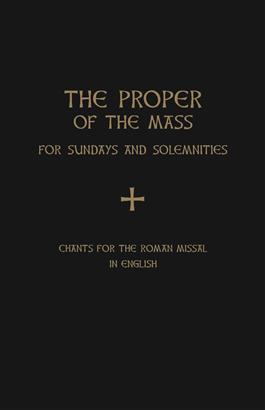
by Fr. Samuel F. Weber O.S.B.
Hardcover; 1292 pages
Introduction by Archbishop Salvatore Cordileone.
The Propers of the Mass book contains English chant settings for the Entrance and Communion Antiphons given in The Roman Missal, 2010, as well as suggestions for the Offertory Antiphons, following the pattern of the Graduale Romanum,1974.
For most antiphons, four levels of settings from complex to very simple are provided, : i. through-composed melismatic; ii. through-composed simple; iii. Gregorian psalm tone; iv. English psalm tone. Optional psalm verses are provided in the Gregorian psalm tone style. Thus this collection provides an option intended to suit the abilities and needs of any choir or cantor.
Ordination and nuptial Masses are also included, as well as the Asperges me and Vidi aquam. The Gloria Patri is given in the eight Gregorian tones, solemn and simple.
Praise for The Proper of the Mass for Sundays and Solemnities:
"I highly recommend this new English Gradual to anyone who wants to sing the proper antiphons on a regular basis and is looking for very accessible, yet most beautiful chant in the vernacular. We cannot thank Fr. Samuel Weber enough for all his hard work, a true labor of love and dedication to liturgy and the Church. I am most confident that this new Gradual will become a standard work and hopefully find a home in many parishes."
- Dr. Horz Buckholtz, Director of Sacred Music Cathedral Basilica of Saint Louis, St. Louis, MO
"Fr. Samuel Weber has performed an outstanding service to the liturgy of the English-speaking world. He has taken the antiphons of the new English translation of the RomanMissal and provided musical settings for them that are accessible to both parishes and choirs of various levels. In doing so, he has enabled the Catholic faithful to encounter the word of God in an English context that has been inaccessible to them for far too long. The Church has, for centuries, used these antiphons in Latin for her official worship, and now Fr. Weber has made that possible in English as well.
Fr. Weber has made a quite remarkable contribution to the handing down of the Tradition-in the midst of the Church-in medio ecclesiae. May this collection serve the Church's liturgy, her 'source and summit' in numerous ways, some of which will be known only in eternity."
- Rev. Kurt Belsole, O.S.B., Director of Liturgical Formation Pontifical North American College, Vatican City
May 5, 2015
"The Avengers" and Friedrich Nietzsche

Robert Downey Jr. stars in a scene from the movie "Avengers: Age of Ultron."
"The Avengers" and Friedrich Nietzsche | Very Rev. Robert Barron | CWR blog
Joss Whedon’s “Avenger” films work as a sort of antidote to Tolkien and Lewis, shaping the imaginations of young people so as to receive a distinctly different message
C.S. Lewis, J.R.R. Tolkien, and their colleagues in the Inklings wanted to write fiction that would effectively “evangelize the imagination,” accustoming the minds, especially of young people, to the hearing of the Christian Gospel. Accordingly, Tolkien’s Gandalf is a figure of Jesus the prophet and Lewis’s Aslan a representation of Christ as both sacrificial victim and victorious king. Happily, the film versions of both The Lord of the Rings and The Chronicles of Narnia have proven to be wildly popular all over the world.
Not so happily, Joss Whedon’s “Avenger” films, the second of which has just appeared, work as a sort of antidote to Tolkien and Lewis, shaping the imaginations of young people so as to receive a distinctly different message. It is certainly relevant to my purpose here to note that Whedon, the auteur behind Buffy the Vampire Slayer, Firefly, and many other well-received films and television programs, is a self-avowed atheist and has, on many occasions, signaled his particular dissatisfaction with the Catholic Church.
I won’t rehearse in too much detail the plot of Avengers: Age of Ultron. Suffice it to say that the world is threatened by an artificial intelligence, by the name of Ultron, who has run amok and incarnated himself in a particularly nasty robotic body. Ultron wants to destroy the human race and has produced an army of robots as his posse. Enter the Avengers—Tony Stark (Iron Man), the Hulk, Black Widow, Captain America, Hawkeye, and Thor—to do battle with the dark forces.
There is an awful lot of CGI bumping and banging and blowing things up, but when the rubble settles, we see that the real struggle is over a perfect body—a synthesis of machine and flesh—that Ultron, with the help of brainwashed scientists, is designing for himself.
May 4, 2015
Equal Treatment and the State’s Interest in Marriage

A figure of a child holding an open book decorates a flagpole outside the U.S. Supreme Court building in Washington. (CNS/Jonathan Ernst, Reuters)
Equal Treatment and the State’s Interest in Marriage | Dr. Patrick Lee | CWR
The state is not in the business of promoting and regulating every sexual-romantic relationship; nor should it categorize all child-raising arrangements as marriages
The US Supreme Court has now heard oral arguments on a case to determine whether it will strike down state laws that grant marriage licenses to opposite-sex couples but not same-sex couples. The main issue is whether denying marriage licenses to same-sex partnerships violates the obligation to provide all groups equal protection of the law. According to the Constitution, no person “shall be denied equal protection of the law.” Is it unjust discrimination, are the laws being applied unequally, when a state grants a marriage license to John and Sally but not to Jim and Steve?
We won’t know what the court will assert until June. But the answer should be: No, because John and Sally, but not Jim and Steve, are able to form the kind of relationship marriage is, and the kind that the state has an interest in promoting and regulating. The state is not in the business of promoting and regulating every sexual-romantic relationship. Nor should it categorize all child-raising arrangements as marriages—think of orphanages or elderly sisters raising abandoned nieces. However, the union of a man and a woman—bodily, emotional, and spiritual—of the kind that would be naturally fulfilled by conceiving and rearing children together (even though in some instances that fulfillment is not reached) is marriage. And this union uniquely provides a crucial benefit the state has an interest in promoting.
The need for such a union is discovered and appreciated somewhat differently by individuals and by societies or states acting on behalf of societies. Individuals typically discover the need for such a union in the following way. Young men and women fall in love and long for union with each other, eventually a union that is bodily (sexual) as well as emotional (the sexual union being not just for gratification but to embody their love). Hence they come to see the need for a more encompassing and enduring personal union as the appropriate context for their love and the sexual acts that express it, and for children that may come from those sexual acts.
Societies see the need for such a union by recognizing the particular benefit it provides to children.
May 2, 2015
Happiness, suffering, conversion, coups...find all these topics and more in our new spring titles
Eight challenging and inspirational new
and recently released spring titles

Renew your mind and spirit
with our new and recently released spring titles
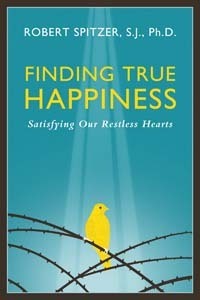
Finding True Happiness
Fr. Robert Spitzer
Softcover, 320 pages
$19.95
Finding True Happiness is both a philosophical itinerary and a practical guidebook for life’s most important journey—from the mundane and the meaningless to transcendent fulfillment. No other book currently available combines such breadth of practical advice and such depth of philosophical, psychological, and spiritual wisdom.
Read a sample


Who Designed the Designer?
Michael Augros
Softcover, 244 pages
$17.95
Here is essential reading for all people who care about contemplating God, not exclusively as a best-explanation for the findings of science, but also as the surprising-yet-inevitable implication of our commonsense contact with reality. Augros takes the reader on an easygoing yet extraordinary journey, beginning from the world as we all encounter it and ending in
the divine mind.
Read a sample

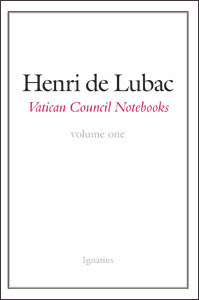
Vatican Council Notebooks: Volume 1
Henri de Lubac
Softcover, 557 pages
$34.95
“Surprising news!” With these words, Fr. Henri de Lubac, S.J., whose orthodoxy had been so vigorously attacked, responded to the announcement of his selection to participate in the 2nd Vatican Council. His participation as a theologian and expert would make a lasting impact on the Council, and his insights and comments are recorded in this long-awaited volume.
Read a sample

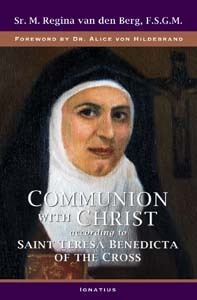
Communion with Christ
Sister M. Regina van den Berg
Softcover, 165 pages
$15.95
Pope Saint John Paul II declared that the great challenge for Christians today is to become "the home and school of communion." St. Teresa Benedicta (Edith Stein) in her life and her writings, is a sure guide to attaining the communion for which every human heart longs. This work considers St. Teresa's life and writings in the context of the "spirituality of communion."
Read a sample


From the Kippah to the Cross
Jean-Marie Élie Setbon
Softcover, 158 pages
$15.95
Jean-Marie Élie Setbon, the son of non-observant Jews, was first attracted to Jesus when he saw a crucifix as a child. His conversion story is about the battle between loyalty to his identity and fidelity to the desires of his heart. It is a love story between Christ, the Lover—the relentless yet patient pursuer—and man,
his beloved.
Read a sample

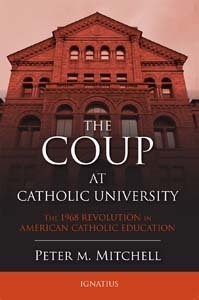
The Coup at Catholic University
Peter Mitchell
Softcover, 320 pages
$19.95
1968 witnessed perhaps the greatest revolution in the history of the Catholic Church in the United States. It was led by Fr. Charles Curran, professor of Theology at the Catholic University of America, with more than 500 theologians who signed a "Statement of Dissent" that declared Catholics were not bound in conscience to follow the Church's teaching in Humanae Vitae.
Read a sample

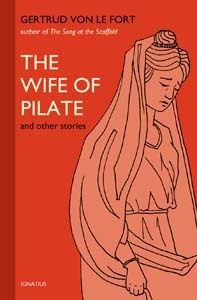
The Wife of Pilate and Other Stories
Gertrud von le Fort
Softcover, 175 pages
$14.95
These three novellas from the acclaimed German writer Gertrud von le Fort are from her later works of historical fiction, in which she displays her mastery as a dramatist of ideas. In these three stories von le Fort presents lyrical portrayals of conflicts in the souls and minds of powerful people. These are thought-provoking stories by a keen observer of humanity.
Read a sample

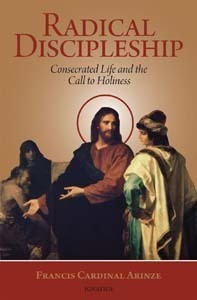
Radical Discipleship
Francis Cardinal Arinze
Softcover, 112 pages
$11.95
Since 2015 has been deemed the Year of the Consecrated Life by Pope Francis, this work by Cardinal Arinze is a very timely one-for this year, and for any time. A reflection on the consecrated life, Radical Discipleship represents a beautiful way for faithful Catholics to participate in this Church-wide theme and celebration by coming to a deeper understanding of the consecrated life.
Read a sample




Website



YouTube
Copyright © 2015 Ignatius Press, All rights reserved.

Share

Tweet

Forward
May 1, 2015
"Labor Day" in Italy and The Feast of St. Joseph the Worker

Left: The secular "holiday"; right: "Joseph the Carpenter" by Georges de La Tour (c. 1645).
"Labor Day" in Italy and The Feast of St. Joseph the Worker | Michael Severance | CWR blog
When divorced from God’s plan, work is merely labor—a rudderless everyday job
Today May 1 is Labor Day in Italy and in virtually all of Europe. Alas, it is hardly festive. There is not much to celebrate here in terms of job growth and wealth creation. Economic figures across this Old and Aging Continent are like proverbial diamonds in the rough: there is much potential for glory, but with a lot of precision cutting and polishing still to do.
Simply read the latest statistical lampoon on European GDP in The Economist on April 14: "Taking Europe’s Pulse". With a walking-dead growth of 0.3% in the first quarter of 2015, nation after European nation is stifled by union strongholds on hiring and firing practices, crony capitalist deals born in Brussels' backrooms, governments’ insatiable appetite for taxation to prop up bankrupt social welfare programs, and many other politico-economic and cultural tentacles holding back a not-so-free European Union.
Here in Rome, few are celebrating in an anemic peninsula with 12.70% unemployment and virtually no growth in the last 20-plus years. Absolutely no fist pumps are raised on this day in traditionally leftist Spain (23.78 %), nor in the communist party-run Greece (25.70%), and by no means in the rebuilding nation of Bosnia and Herzegovina (43.78%).
Nonetheless today, for good measure, is a public ‘holiday’, whether the economic mood is truly merry or not. At least it is a day to put workers’ worries aside. It is a day to forget about the sorry state of many economies on this extended weekend when Europeans head to the mountains, sea and its many cities of art.
May 1 is also a ‘holy day’, the Catholic Feast of St. Joseph the Worker instituted by Pius XII in 1955 in response to the May Day communist celebrations installed across Europe. Therefore, it is no small coincidence of calendar or etymology.
According to the American Catholic web site, Pius XII’s intention was, in effect, to give deeper meaning to a public holiday de-christened merely as ‘Labor’ Day in a hyper-secularized and socialist Europe. It was a day, though mixed with revelry and parades, that had become, spiritually speaking, a hum-drum day off from routine of production lines and cubicles:
In a constantly necessary effort to keep Jesus from being removed from ordinary human life, the Church has from the beginning proudly emphasized that Jesus was a carpenter, obviously trained by Joseph in both the satisfactions and the drudgery of that vocation. Humanity is like God not only in thinking and loving, but also in creating. Whether we make a table or a cathedral, we are called to bear fruit with our hands and mind, ultimately for the building up of the Body of Christ.
When divorced from God’s plan, work is merely labor, a rudderless everyday job. It even can turn us into hunchbacks, as if debilitated and humiliated by meaningless, repetitive, backbreaking activity.
This is exactly what I find lamentable about today.
New: "Finding True Happiness: Satisfying Our Restless Hearts"
Now available from Ignatius Press:
Finding True Happiness: Satisfying Our Restless Hearts 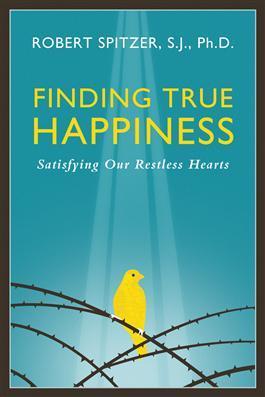
by Fr. Robert Spitzer, SJ
One of the hottest topics in contemporary culture is happiness—so much so that the United Nations declared an International Happiness Day in response to the immense popularity of Pharrell Williams’ song “Happy”. The explanation for this current fixation seems to lie in the contrary phenomenon—unhappiness. Despite the fact that we have tremendous access to every imaginable form of entertainment, we experience a pervading sense of insecurity, emptiness, and malaise amid sporadic peak experiences.
The problem seems to lie less in the external environment than in the internal one. We seem, in the words of Viktor Frankl, to be suffering from an absence of meaning that pervades both individuals and societies, giving rise to a collective emptiness, loneliness, and alienation.
Finding True Happiness attempts to provide a way out of this personal and cultural vacuum by helping people to identify and then reach for happiness. As Aristotle noted 2,400 years ago, happiness is the one thing we can choose for its own sake—everything else is chosen for the sake of happiness.
After an exhaustive investigation of philosophical, psychological, and theological systems of happiness, author Fr. Spitzer developed the “Four Levels of Happiness”, which he based on the classical thinkers Plato, Aristotle, Augustine, and Aquinas; the contemporary philosophers Marcel, Scheler, Buber, Ricoeur, and Jaspers; and the modern psychologists Maslow, Frankl, Erikson, Seligman, Kohlberg and Gilligan.
Finding True Happiness is both a philosophical itinerary and a practical guidebook for life’s most important journey—from the mundane and the meaningless to transcendent fulfillment. No other book currently available combines such breadth of practical advice and such depth of philosophical, psychological, and spiritual wisdom.
Robert J. Spitzer, S.J., Ph.D. is the former president of Gonzaga University and the founder of the Magis Institute, which educates the public about the relationship between physics, philosophy, reason, and faith. He is the chief education officer of the Ethics and Performance Institute, which delivers web-based ethics education to corporations and individuals, and President of the Spitzer Center of Ethical Leadership, which delivers similar curricula to non-profit organizations. He is the author of Healing the Culture, Five Pillars of the Spiritual Life, and Ten Universal Principles.
Praise for Finding True Happiness:
"Even in the darkest hours, happiness is available to us; it is always a choice. In our culture--riddled with cynicism, nihilism, envy, and anger--recognizing that this choice exists is difficult. With reason, with the logic of both the mind and the heart, Robert Spitzer not only convinces us that happiness is within everyone's grasp but also shows us how to seize it. This is an intelligent, warm, and life-changing book."
- Dean Koontz, N Y Times #1 Best-selling Author
“How refreshing to hear from a mind like Fr. Robert Spitzer on the topic of happiness. Too often, books in this genre offer platitudinous advice that is only an inch deep. In refreshing contrast, Fr. Spitzer offers us a meaty book that dives deep into history, philosophy, and science to provide answers that truly satisfy.”
- Jennifer Fulwiler, Author, Something Other Than God
“Fr. Spitzer is a fine guide to the one thing that every human being in the world is seeking: happiness. Read this book and grow wiser in the things of the Spirit.”
- Mark P. Shea, Author, By What Authority?
“One of the most dangerous and destructive illusions of the modern era is the notion that individuals are entirely free to choose what will make them happy. Fr. Spitzer shows that there is a genuinely objective dimension to human happiness, and that some approaches to life are simply incapable of actually bringing about the happiness that human beings desire. He offers a timely explanation of the routes that are really productive of fulfillment and true happiness.”
- Fr. Joseph Koterski, S.J., Professor of Philosophy, Fordham University
“All who are interested in true happiness—and finding it—will find this book a very valuable contribution to their search. Spitzer identifies many practical steps for finding the happiness that so many find illusive. I especially admired his rationale for the validity and importance of his highest level of happiness, that which is found in our experience of the transcendent. I recommend that all examine his brilliant summary of evidence for transcendence --and for its fundamental contribution to happiness. This is a book to read and ponder.”
- Paul Vitz, Ph. D., Institute for the Psychological Sciences
Wolfe, Innocence, Literature, and Rock Monsters

Wolfe, Innocence, Literature, and Rock Monsters | John Herreid | IPNovels.com
In the past week I’ve ended up saving a number of links to read and re-read, and in the hopes that others may also get some enjoyment and interest from them I’m sharing them with you.
First up, there’s a short piece in the New Yorker about science-fiction writer Gene Wolfe, titled Sci-Fi’s Difficult Genius:
Moments [in his books] have turned many of Wolfe’s fans into something like Biblical exegetes, who dig deep into his texts in the hope of finding clues not only to the plots and the characters but to Wolfe’s larger intentions. Partly what readers are excavating is Wolfe’s Catholicism, which he is quick to say figures into his writing. “What is impossible is to keep it out,” he told me. “The author cannot prevent the work being his or hers.”
Over at The Catholic Thing, Daniel McInerney writes about Catholic Literature and the discussion about it between writers such as Gregory Wolfe, Paul Elie, and Dana Gioia. I’m not so sure I agree with his take on it, but it’s an interesting contribution to the discussion.
April 29, 2015
Attacks on San Francisco Priest Aim to Test Abp. Cordileone

Fr. Joseph Illo processes up the aisle at Star of the Sea Church in San Francisco April 25. (Photo by Eva Muntean)
Attacks on San Francisco Priest Aim to Test Abp. Cordileone | Jim Graves and CWR Staff | Catholic World Report
Recent reports about accusations made 10 years ago against Fr. Joseph Illo leave out key facts and misrepresent the subsequent court case.
The embattled pastor of a San Francisco parish has been the target of an unrelenting campaign aimed at pressuring Archbishop Salvatore Cordileone to oust him. At the same time, the charges against Father Joseph Illo are being used as part of a larger effort to lobby Pope Francis to remove the archbishop, according to local observers. This week, the Archdiocese of San Francisco quietly announced that a priest has been assigned as chaplain at the parish’s school.
The connection between the efforts to push out both priest and archbishop became national news when more than 100 “prominent Catholics” published a full-page open letter to Pope Francis in the April 16 edition of the San Francisco Chronicle. “Please replace Archbishop Cordileone,” the letter asked the Pope. Many of the signers are known to oppose Catholic teaching on marriage.
Among the letter’s grievances against the archbishop was his selection of Father Illo as the pastor of Star of the Sea Parish. Father Illo “marginalizes women’s participation in the church by banning girls from altar service,” the letter claimed (Father Illo explained his altar-server policy to CWR in January; he later agreed to let girls serve as acolytes at school Masses at Star of the Sea, while retaining his “boys-only” policy for parish Masses, as this move had been welcomed by regular Mass-goers). Father Illo also “inexplicably distributed to elementary school children an age-inappropriate and potentially abusive, sexually-oriented pamphlet,” the letter states (Father Illo apologized for the incident as an “oversight” and said the pamphlet—an examination of conscience—should have been given to the parents instead of the children). Finally, the letter to the Holy Father alleges that Father Illo has a “troubled history of questionable judgment as a pastor outside our diocese.”
It now appears that the “troubled history” ascribed to Father Illo refers to a civil settlement from a decade ago. Certain documents concerning the case were recently distributed to parents and teachers at Star of the Sea School, and a series of local media reports indicate that some parents have renewed calls for Father Illo’s removal in light of this case. This week the archdiocese announced that Father Vito J. Perone has been assigned as chaplain at Star of the Sea School, although Father Illo has not been removed from his post as parish administrator.
In March 2005, a San Joaquin County Superior Court jury found that Father Illo had inflicted emotional distress on an 11-year-old girl who had accused his associate pastor, Father Francis Arakal, of sexual misconduct in September 2001. A criminal investigation after the girl’s accusation had found no evidence of wrongdoing on the part of Father Arakal, but the following year the girl’s mother filed a lawsuit against Father Arakal, Father Illo, and the Diocese of Stockton, alleging sexual battery and intentional infliction of emotional distress, among other things.
Two Approaches To Culture: Evangelistic & Diagnostic

Fr. Robert Barron, author of "Seeds of the Word" (www.WordonFire.org) and Dr. James
A. Patrick, author of "Essays on Modernity and the Permanent Things" (www.TowerPressBooks.com)
Two Approaches To Culture: Evangelistic & Diagnostic | Carl E. Olson | CWR Editorial
New books by Fr. Robert Barron and Dr. James A. Patrick are exceptional guides to the confused and confounding dominant culture
“The best is the betting of one's very life on behalf of Christ, the good, the self-denying and the dangerous.” — Dr. James A. Patrick
"The authentically Christian spiritual itinerary never ends with something as bland as 'self-discovery.' Rather, it ends with the splendid privilege of participating in God's own work in bringing grace into the world." — Fr. Robert Barron
[Robert] Graves really is writing about our own age, not of some remote future: of life in today's United States .... He is saying that culture arises from the cult; and that when belief in the cult has been wretchedly enfeebled, the culture will decay swiftly. The material order rests upon the spiritual order.” — Russell Kirk, “Civilization Without Religion?”
A friend, having recently read Fr. Robert Barron's review of Kenneth Branagh's movie, “Cinderella”, sent me this quote from Cardinal John Henry Newman:
“With Christians, a poetical view of things is a duty. We are bid to color all things with hues of faith, to see a divine meaning in every event.”
It's an apt description of a Christian cultural critic, and Fr. Barron is an especially fine commentator on culture, whether it be “high”, “low”, or “pop” culture. His new book Seeds of the Word: Finding God in the Culture (Word on Fire, 2015) is a collection of over 80 of his essays about movies (“Imago Dei: God in Film”), literature (“Take and Read: God in Books”), politics (“City On a Hill”), and culture at large (“Rays of Truth”). It is an exceptional example of an accomplished academic—Fr. Barron is a skilled theologian and the Rector/President of Mundelein Seminary in Chicago—engaging with the good, bad, beautiful, and ugly found throughout American culture.
It's important to point out that Fr. Barron, who I've had the pleasure of working for on two catechetical series (“Catholicism” and “Priest Prophet King”), is fundamentally motivated by a love for God, truth, and souls. In an homage written a week ago for the late Cardinal Francis George, Fr. Barron highlights the missionary vision and heart of the late Archbishop of Chicago. He notes that Cardinal George was not satisfied with Catholics taking a “counter-cultural” stance only, as “this can suggest a simple animosity, whereas the successful evangelist must love the culture he is endeavoring to address":
But he saw a deeper problem as well, namely, that, strictly speaking, it is impossible to be thoroughly counter-cultural, since such an attitude would set one, finally, against oneself. It would be a bit like a fish adamantly insisting that he swims athwart the ocean. Therefore, the one who would proclaim the Gospel in the contemporary American setting must appreciate that the American culture is sown liberally with semina verbi (seeds of the Word).
This approach, as he explains in his book, is an adaptation of the patristic method of seeking out “seeds of the Word”—“hints and echoes of the Gospel that can be found, often in distorted form, in the high and low contemporary culture.”
Carl E. Olson's Blog
- Carl E. Olson's profile
- 20 followers



